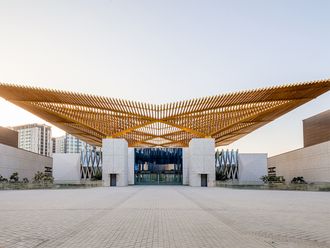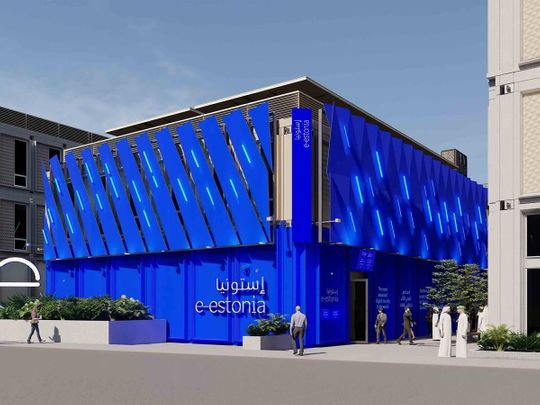
Dubai: Imagine a world where you can buy a house through a digital signature without even having to step into a real estate office – this is how Estonians go about their day in the smart state they call home. Everything under the sky is possible in e-Estonia, says Daniel Schaer, the Commissioner General of Estonia Pavilion at Expo 2020 Dubai, save for two things: “You can’t get married and you can’t get divorced online.”
The northern European country hopes to share its revolutionary e-experience with the Gulf Cooperation Council (GCC) region – a natural course of action having established its embassy in Abu Dhabi just three years ago. “I think it’s the place we have to be,” comments Schaer on Estonia’s participation in the World Expo in an interview with Gulf News. “We believe that digital revolution is here. It has already happened in our country and in others, and we want to make sure that everybody is going in the same direction.”

I think [Expo 2020 Dubai] is the place we have to be. We believe that digital revolution is here. It has already happened in our country and in others, and we want to make sure that everybody is going in the same direction.
Estonia saves paper as high as Eiffel Tower
Situated in the Mobility District, a zone that explores smarter movement of people, goods and services, the Estonian pavilion tells the story of how its citizens save time, money and resources when they avail services online. According to Schaer, studies show that Estonia’s seamlessly interlinked digital platform, connecting both public and private sectors, saves stacks of paper as high as the Eiffel Tower (300 metres) every year.
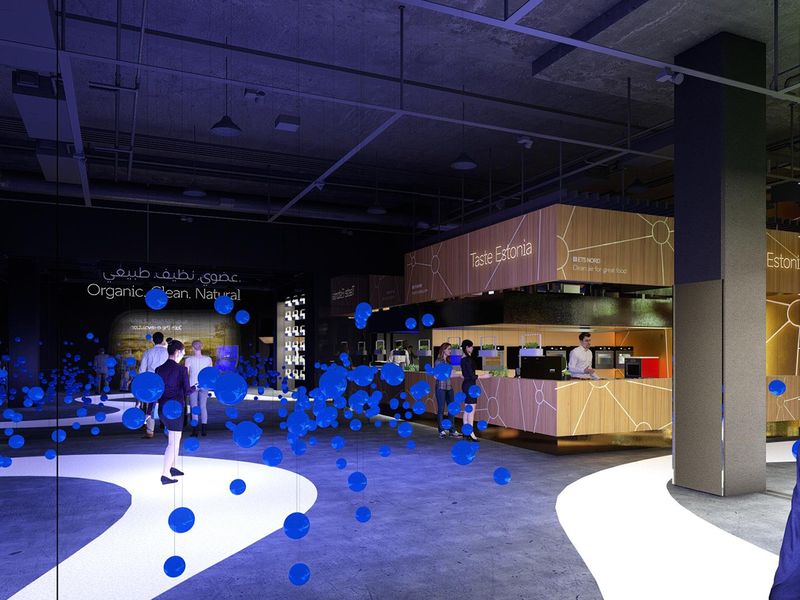
Estonia’s ‘e-story’ will present its case for digital revolution on the first floor, where visitors will familiarise themselves with the country’s journey and the measurable benefits of going online not partially but fully as a country.
The next leg of the visitor journey is dedicated to smart solutions. Having partnered with more than 40 companies and organisations, the Estonian pavilion will deliver e-solutions across a spectrum of industries – from healthcare, education, food to technology, transport and cities. “Every partner’s contribution to the [Estonian] e-society will be presented,” says Schaer.
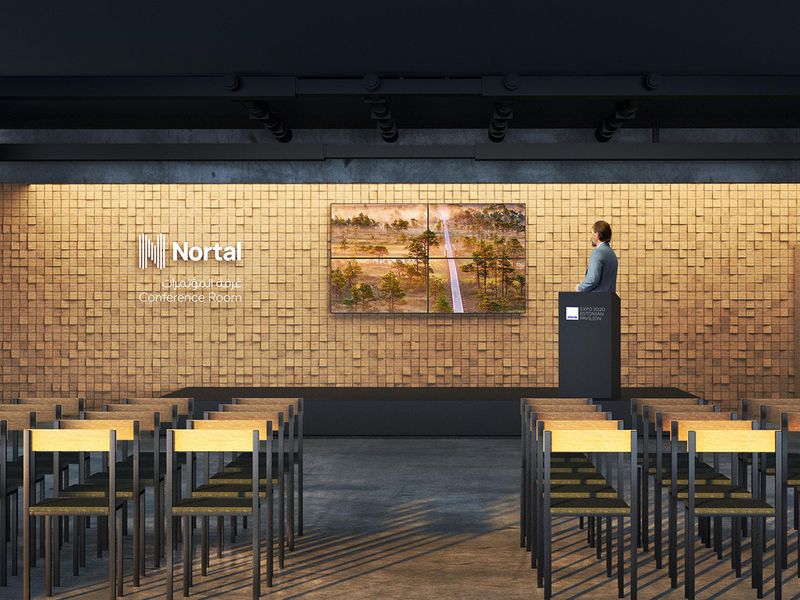
Interested partners can then move on to the second floor, where they can discuss potential partnerships and attend business events.
At these rotating events country pavilions across the site will shed light and share knowhow on topics such as big data, artificial intelligence (AI) and e-government.
“In addition to living a digital lifestyle, we’re also looking at the sustainability side,” adds Schaer.
As wired as the country is, Estonia also pays tribute to its vast Nordic forests in its concluding story. Estonian seasonal produce such as berries and mushrooms as well as street food will be up for a taste at the pavilion cafe, whose ventilation system, set up by ETS NORD, sustainably filters smoke, steam and cooking smells before pumping the air out.
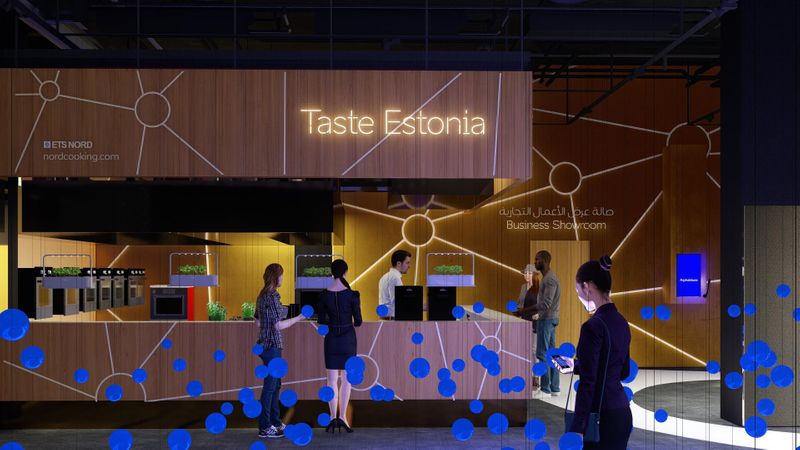
Walk among data clouds
World building in the Estonian pavilion begins with floating data cloud installations, making for a visual digital experience – an approach better suited for storytelling, according to Schaer, as opposed to reading off of informational plaques.
Tallin-based architecture firm Koko gives form to the smart oasis through installations of 400 neon blue lightbulbs, suspended at varying levels, which mimic data clouds inside the X-Road – a digital highway that connects all databases in e-Estonia.
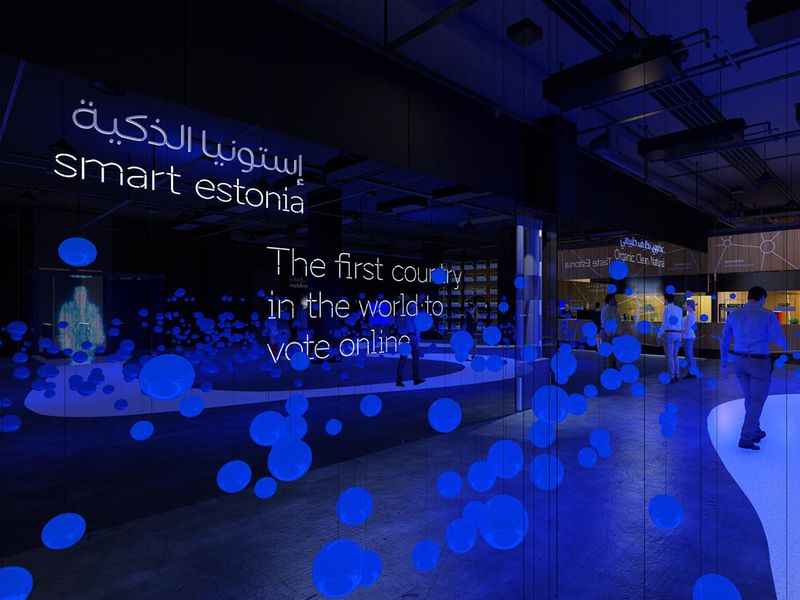
Mirror-cladded walls with the help of augmented reality will create infinite reflections of the miniature spheres, giving depth to the exhibition space.
Meet Yanu, your robot server
Visitors will be served drinks at a contactless coffee bar run by Yanu, a robotic arm powered by AI from the future. Not only will the autonomous server take your order and prepare your drinks but it might crack a joke or two along the way to break the ice.
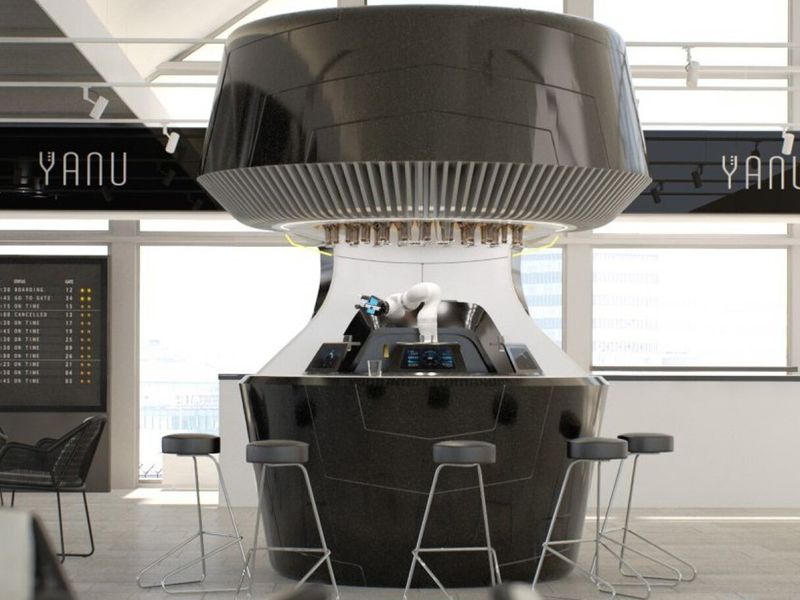
State-of-the-art technology has gone into building a robot with its own personality, making it a seamless replacement for a human server capable of holding conversations. Developed by Robolab, a Tallinn-based robotics company, Yanu is fully capable of handling payments without coming in contact with customers.
Smart cities with smart crosswalks
Besides technologically advanced commercial solutions, Estonia’s technical expertise extends to smart city solutions to build a more people-centric urban environment.
“Some of our partners will be introducing smart city solutions, which will be integrated into the pavilion story,” says Schaer. One such city and partner to the pavilion is Tartu, which has built smart crosswalks into the streets of Fortuuna and Pikk.
Using LED and voice command warnings, the smart traffic sign at pedestrian crossings alerts all road users of possible collision hazards, collating and analysing traffic reports at all times. While it measures the speed of the road users, the sign is also capable of monitoring air pollution levels and classifying vehicles by length.
Connecting minds in a pandemic
In an effort to bolster partnerships during unprecedented times, Estonia took pre-emptive measures to reach out to its partners with relation-building activities prior to Expo 2020 Dubai: “We decided that we had to help our partners and work together with them,” adds Schaer.

We organised a series of webinars to introduce our partners, who presented their companies and solutions, to different countries – be it B2B or B2G. We’ve been focusing on connecting minds prior to the Expo through our e-solutions to bring each other closer.
“We organised a series of webinars to introduce our partners, who presented their companies and solutions, to different countries – be it B2B or B2G. We’ve been focusing on connecting minds prior to the Expo through our e-solutions to bring each other closer.”
- The writer is an intern with Gulf News.





